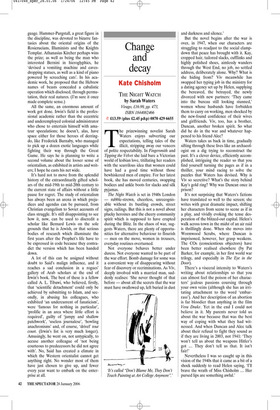Change and decay
Kate Chisholm
THE NIGHT WATCH by Sarah Waters Virago, £16.99, pp. 473, ISBN 1844082466 ✆ £13.59 (plus £2.45 p&p) 0870 429 6655 The prizewinning novelist Sarah Waters enjoys subverting our expectations, telling tales of the illicit, stripping away our veneers of polite respectability. In Fingersmith and Tipping the Velvet she laid bare a Victorian world of lesbian love, titillating her readers with the scurrilous idea that women could have had a good time without those bewhiskered men of empire. For her latest book, she has moved centuries, swapping bodices and ankle boots for slacks and silk pyjamas.
The Night Watch is set in 1940s London — rubble-strewn, cheerless, unrecognisable without its bustling crowds, street signs, railings. But this is not a novel about plucky heroines and the cheery community spirit which is supposed to have erupted during the Blitz. In the chaos of war, suggests Waters, there are plenty of opportunities for alternative behaviour to flourish — men on the move, women in trousers, everyday routines overturned.
Not everyone behaves better under duress. Not everyone wanted to be part of the war effort. Bomb damage for some was a convenient way of disappearing without fear of discovery or recriminations. As Viv, deeply involved with a married man, suddenly realises: ‘She never thought of that before — about all the secrets that the war must have swallowed up, left buried in dust and darkness and silence.’ But the novel begins after the war is over, in 1947, when our characters are struggling to readjust to the social clampdown that peace has brought with it. Kay, cropped hair, tailored slacks, cufflinks and highly polished shoes, aimlessly wanders through the West End, no job, no settled address, deliberately alone. Why? What is she hiding from? Viv meanwhile has swapped her typing job in the ministry for a dating agency set up by Helen, supplying the bereaved, the betrayed, the newly divorced with new partners: ‘They came into the bureau still looking stunned,’ women whose husbands have forbidden them to carry on working, men shocked by the new-found confidence of their wives and girlfriends. Viv, too, has a brother, Duncan, another broken spirit. So what did he do in the war and whatever happened to his friend Alec?
Waters takes us back in time, gradually sifting through these lives like an archaeologist on a dig trying to reconstruct the past. It’s a clever device, efficiently accomplished, intriguing the reader so that you find yourself turning the pages as if in a thriller, your mind racing to solve the puzzles that Waters has devised. Why is Viv so secretive? What’s the story behind Kay’s gold ring? Why was Duncan once in prison?
It’s not surprising that Waters’s fictions have translated so well to the screen; she writes with great dramatic impact, shifting her characters from scene to scene as if in a play, and vividly evoking the tense desperation of the blitzed-out capital. Helen’s walk across town in the midst of an air raid is thrillingly done. When she moves into Wormwood Scrubs, where Duncan is imprisoned, however, her grasp weakens. The COs (conscientious objectors) have been better realised elsewhere (by Pat Barker, for example, in her first world war trilogy, and especially in The Eye in the Door).
There’s a visceral intensity to Waters’s writing about relationships so that you can almost feel the poison of her characters’ jealous passions coursing through your own veins (although she has an irritating attachment to the word ‘embarrass’). And her description of an abortion is far bloodier than anything in the film Vera Drake. Yet in the end I could not believe in it. My parents never told us about the war because that was the best way of coping with what they had witnessed. And when Duncan and Alec talk about their refusal to fight they sound as if they are living in 2003, not 1941: ‘They won’t tell us about the weapons Hitler’s got ... They don’t tell us that. It isn’t fair!’ Nevertheless I was so caught up in this vision of the 1940s that it came as a bit of a shock suddenly to read Helen saying, ‘I’ll brave the wrath of Miss Chisholm ... Her pursed lips are something awful.’






















































 Previous page
Previous page